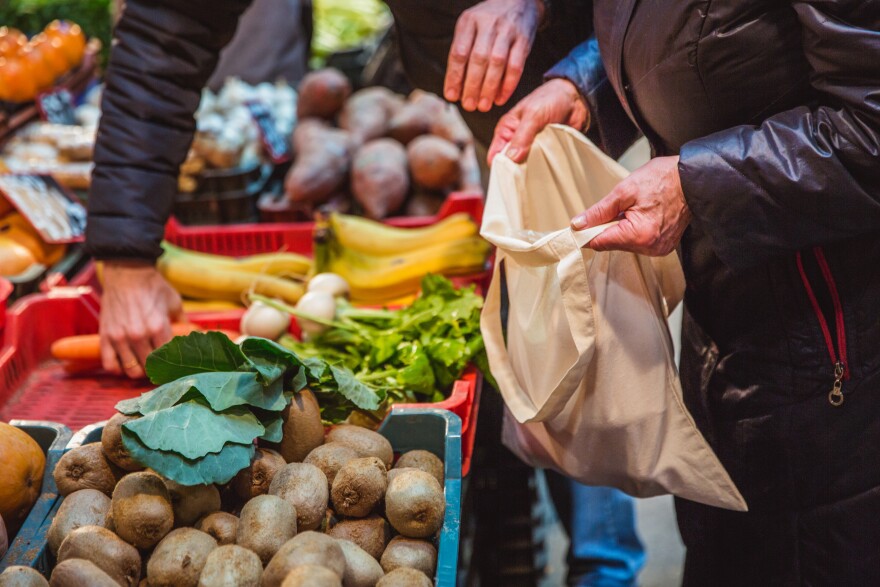Summer officially begins this week, but it hasn’t felt like it. All around the region, and even the country, farmers’ fields are flooded, preventing many farmers from both planting and harvesting crops they depend on for their livelihood.
And with farmers’ market season underway, you might notice fewer varieties of produce than you’re used to — and a later harvest, too. Farmer and contributor Dave Kozlowski is dealing with those struggles at Pinehold Gardens in Oak Creek. He joined Lake Effect's Audrey Nowakowski to talk about the challenges he’s facing and give some advice for what to look out for this year and what we can get excited about (even if it's still a little chilly out):
Most things that are planted in the ground are going to take a minimum of 50-60 days to come to fruition, according to Kozlowski. "We're already in mid-June, so a month and a half at the earliest puts us in August so there's not much I can really pull early before that," he notes. "It's just not gonna be a banner year."
What To Expect
Mold, mildew and diseases on plants
The damp weather heightens the chance of produce being affected by different diseases — particularly late blight, says Kozlowski. If you see a bullseye shape on your tomato plant, pull it out of your garden!
Dull, watery and mushy fruits
It turns out that heat is conducive to more than just beach days. It's needed to help concentrate sugar in fruits, and without it, Kozlowski says we can expect a less sweet crop this year.
"Don't anticipate super-sweet strawberries, super-sweet melons, if this rain keeps up. The ones that do survive disease are going to seem a bit watery or mushy," he explains.
Less orchard fruit
Kozlowski says he noticed that his fruit trees have very little fruit on them this year, which means they weren’t pollinated as much as past years. It makes sense, he says, because the bees weren't getting out and about as much in the rain and cold.

Lots of leafy greens
Leafy greens, as well as onions, garlic, and shallots love this cool, wet weather.
A long, warm fall
Optimistic farmers like Kozlowski are hoping that the growing season will continue long past the typical first frost date, which usually hits around mid-September, so that we'll have crops.
Though Kozlowski says this might not be a "banner year," many markets in the area will still have a variety of produce in season such as arugula, asparagus, beets, beans, broccoli, cabbage, leafy greens, peas, carrots and potatoes.
This farmers market season is going to be "here today, gone tomorrow." Here are a few of his insider tips for how to best navigate the farmers market and get the most out of your fresh, local fruits and vegetables:
Farmers Market Dos
"Eat it fresh and eat it soon"
Your produce will taste better and will have the most flavor the earlier that you eat it.
Keep your fruits cold, except tomatoes
Most fruits do best in the fridge, and tomatoes thrive on the kitchen counter and keep their flavor.

Greens like to be kept moist, but not too moist
"With most things you really don't want to wash them before your store them because you don't want that extra moisture on them. That will just cause all sorts of problems," says Kozlowski. He recommends putting your produce in a plastic bag in fridge. Mesh bags are also a good option to make sure water isn't building up. Also, take the rubber band off of bunches like spinach and cilantro and separate the leaves to get the best flavor, Kozlowski says.
Cucumbers stay better on the countertop
If the harvest does end up yielding this summer staple, Kozlowski says he prefers to keep his favorite summer produce out at room temperature. "I never have much luck putting cukes in the fridge, they just seem to stay better on the countertop," he says.
Keep garlic and potatoes cool, dark, and dry
Don't refrigerate, because it will dehydrate them, and make sure they're not basking in the sun.
"Garlic should be kept out of the light, in a cool place - but not a cold place. Not the refrigerator," he notes. "Keep it in a bag in your silverware drawer, or something like that."

Bring your own bags
Make it easier on the farmers and reduce the amount of plastic we have circulating in our environment.
Bring cash
"I understand we are becoming a paperless generation, but it's just far more convenient and quicker to exchange cash," says Kozlowski.
And if you do want to pay with a card, be prepared to also pay the card processing fee.
Be respectful and patient
Farmers are people too, and "it's a tough job standing there helping customers all day long," notes Kozlowski. "And if you have questions, be patient with a quick answer. We can't always sit there and have a long discussion with you on a product [if it's busy]."
Farmers Market Don'ts
Don’t wash your produce before you store it
The extra moisture can lead to mold or premature rotting.
Don't let your pets by the farm stands
As cute as they are, Kozlowski says it's better if they stay away from the food farmers are trying to sell. "Nobody really wants to stop at your farmstead if they saw a dog licking the rutabagas."
Don’t handle all the fruit by hand
As good as it looks, try to resist the temptation. People don't want to buy produce they saw everyone else touching. "It's not that you're necessarily going to damage it, we know you're going to be careful with it. But I guess it's just sort of an optics thing," notes Kozlowski.
Don’t try to negotiate prices
"Don't do it and don't expect to get a better price," says Kozlowski. Farmers at farmers markets know what their costs are and what retail prices are, and they typically try to price produce below the retail cost. Kozlowski said it can get awkward when people try to barter with him.







